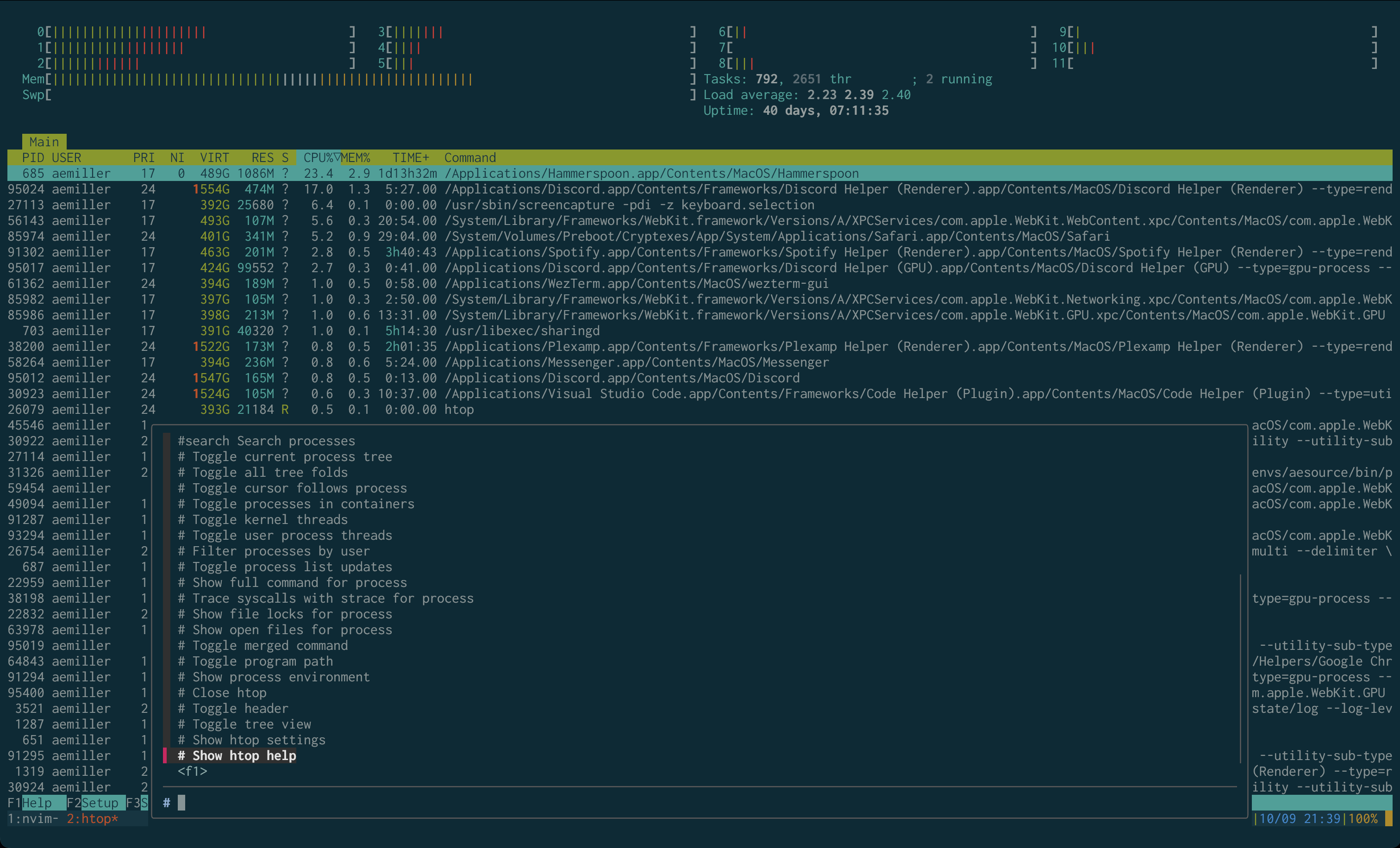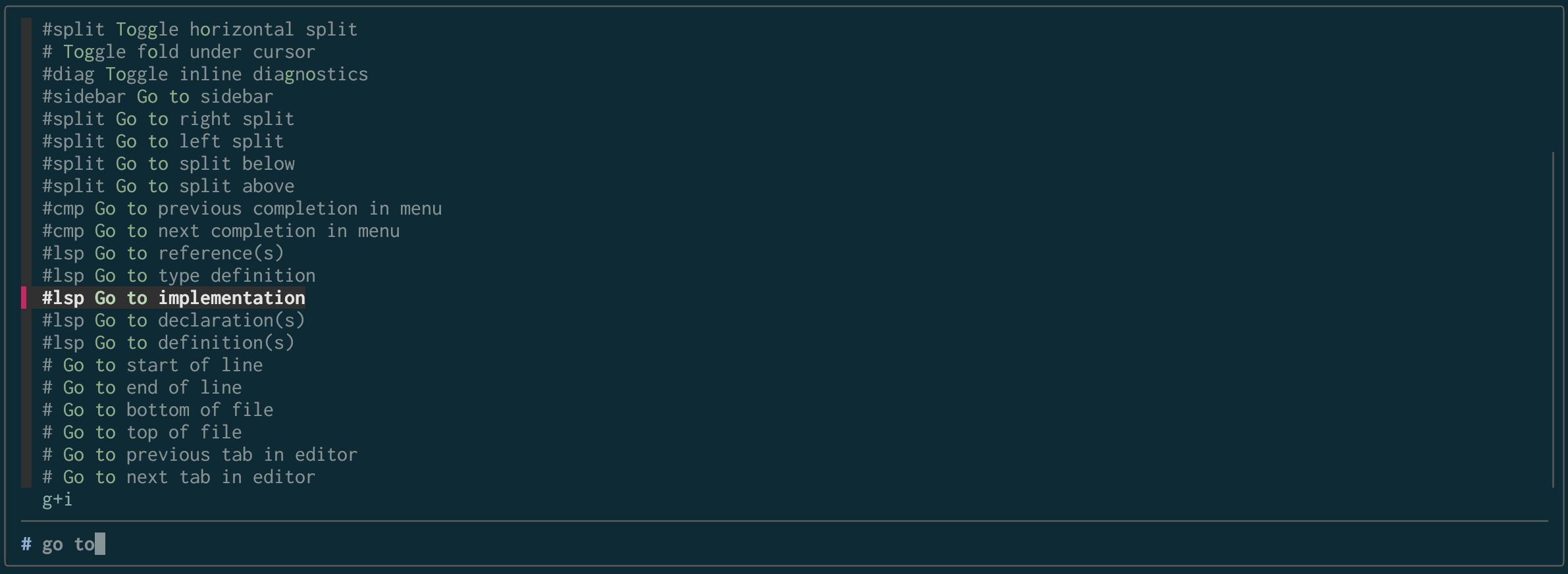keyslib is a Python library for working with key sequences. It has a standard
grammar for expressing them, as well as pathlib-like overloads of standard binary
operators for composing key sequences in code:
from keyslib import KeySequence
TMUX_PREFIX = KeySequence("(ctrl)b")
TMUX_CREATE_WINDOW = TMUX_PREFIX + "c"
# (ctrl)b+c
print(TMUX_CREATE_WINDOW)In addition to key parsing, keyslib also has a keys CLI. The quickest way to
start using the CLI is with the uv package
manager:
# See uv README for other installation options
curl -LsSf https://astral.sh/uv/install.sh | sh
alias keys='uvx --from keyslib keys'The keys CLI can be used to format sequences for different applications:
# For a tmux send-keys command:
keys format tmux "(ctrl)b+c"
C-b c
# For a Visual Studio Code keybindings.json file:
keys format vscode "(ctrl)b+c"
ctrl+b c
# For a call to the Hammerspoon mac automation framework:
keys format hammerspoon "(ctrl)b+c"
hs.eventtap.keyStroke({"ctrl"}, "b"); hs.eventtap.keyStroke({}, "c");The keys CLI can also directly control applications using the send command:
# tmux send-keys 'C-b' 'c'
keys send tmux "(ctrl)b+c"
# echo '\x02c' | wezterm cli send-text --no-paste
keys send wezterm "(ctrl)b+c"
# hs -q -c 'hs.eventtap.keyStroke({"ctrl"}, "b"); hs.eventtap.keyStroke({}, "c");'
keys send hammerspoon "(ctrl)b+c"Collections of key bindings can be stored in the form of "keys files", which are just dotenv files:
CREATE_WINDOW='(ctrl)b+c #window Create window'
SPLIT_WINDOW_VERTICAL='(ctrl)b+% #pane Create vertical split'
SPLIT_WINDOW_HORIZONTAL='(ctrl)b+<quote> #pane Create horizontal split'These files can be written by hand or generated via Python and the keys build
command. See example/keys/tmux.py for an example.
Putting it all together, the tools/kcmp.sh script provides
an interactive key completion menu via the fzf
CLI:
In this example, keys are loaded from ~/.config/keyslib/binds/nvim.env and are
sent via a tmux send-keys command.
Additionally, a tmux plugin is available to bind kcmp.sh to a hotkey:

To enable it with tpm:
# Run general keys completion, which will invoke kcmp tmux <app> with <app> being
# filled in with the command running in the current pane
set -g @keys_complete_key "Space"
set -g @plugin "adammillerio/keyslib"When the complete hotkey is pressed, the plugin
will use tmux list-panes -F '#{pane_current_command}' to determine the current
running command. If there is a matching keys file at
~/.config/keyslib/binds/<cmd>.env, it will be displayed in a tmux window via
kcmp.sh. The selected key sequence is then sent to the active pane via tmux.
This provides a context-specific "command palette" like experience for terminal
applications.
All development on keyslib can be handled through the uv tool:
uv sync
Resolved 24 packages in 9ms
Audited 23 packages in 0.56msInvocations of uv will read configuration from the pyproject.toml
file and configure a virtual environment with keyslib and it's dependencies under
.venv in the repository.
Ensure no type errors are present with pyre:
uv run pyre check
ƛ No type errors foundNote: Pyre daemonizes itself on first run for faster subsequent executions. Be
sure to shut it down with uv run pyre stop when finished.
Format code with the ruff formatter:
uv run ruff format
27 files left unchangedRun the test suite with testslide:
uv run testslide test/*.py
Executed 21 examples in 0.1s:
Successful: 21
Failed: 0
Skipped: 0
Not executed: 0
https://testslide.readthedocs.io/
